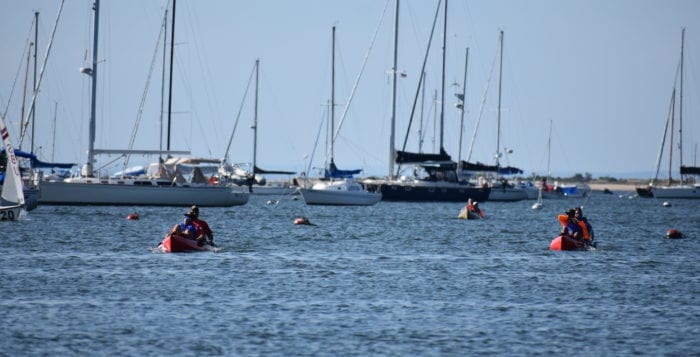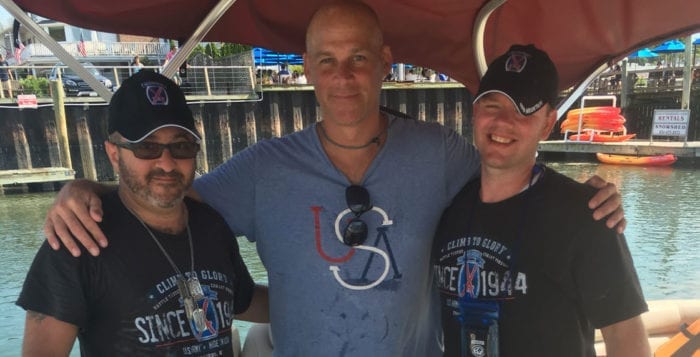August 30 was a day about numbers.
Twenty-two kayakers in 11 boats. Twenty-two miles from Bridgeport to Port Jefferson.
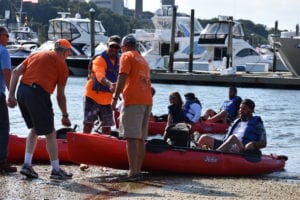
On each of their minds, the estimated 22 veterans who commit suicide each day, and the many thousands more both veterans and others who suffer from PTSD.
In the final days of summer, the 22 veterans left Bridgeport at just after 10 a.m. and arrived in Port Jefferson at just before 5 p.m. As the fourth year of the event, called the 22-PTSD Awareness Challenge, those veterans have a long way to travel, having to turn their boats in a slight parabola to make it the full 22 miles.
Frank Lombardi, one of the co-founders of the event and a veteran himself, said the event is extremely poignant just by the number. Veterans Affairs averages the number of soldiers and veterans who commit suicide at approximately 20 a day.
“Twenty-two veterans make the 22-mile trek, and that’s the magic number,” he said.
22-PTSD Awareness Challenge was started in 2016 with Lombardi, fellow veteran Chris Levi and Alex Rohman, an executive of the Port Jefferson Station-based financial advisors Time Capital. That business, plus three others, helped get the first event up and running. At first, the three co-founders were the only ones to cross. Since then the number of veterans taking the challenge has only increased.
“I found that if I can get veterans to help other veterans, that’s the best way to help them,” said Rohman. “A lot of organizations compete for veterans, in a way, and we wanted to open this up to as many nonprofits as we can, so a veteran can walk in and see a multitude of services that can help.
On their arrival in Port Jefferson, the Port Jeff Village Center was crammed full of a number of veterans services initiatives for them to peruse. PSEG Long Island, while not sponsoring the event, aided the initiative through its community partnership program by providing volunteers. Eight of the kayakers were also employees of PSEG Long Island.
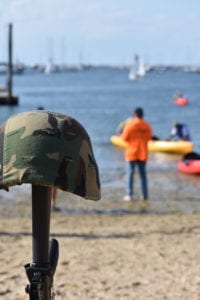
Two tables were for Independent Group Home Living Program, of which Lombardi is CEO. The money, Lombardi said, is going to Victims Information Bureau of Suffolk County, a subsidiary of IGHL that provides therapy services for veterans, among its other services for those experiencing family violence and rape. The first year of the event raised $60,000 to start a treatment program at VIBS, hiring a treatment specialist. While the amount they annually raise has gone down to around $15,000 per event, the IGHL CEO said the event now focuses more on outreach and getting veterans in touch with the services that can help them.
The veterans who kayaked said the Sound was relatively easy on the swell, though that didn’t stop the wind from picking up at the opposite direction once they neared Port Jefferson Harbor. The kayaks they rode in used pedals instead of oars, though the trek wasn’t any less tiring for it, with veterans of several different ages participating.
Friends and fellow veterans Martino Cascio, of Huntington, and Dennis Stringer, of New Hampshire, laughed as they described Cascio flipping their boat to dunk Stringer in the water.
Still, the two, who together completed several tours in Iraq and Afghanistan, had a refrain running through their heads. Both have known fellow veterans who suffer from PTSD and others who took their own lives.
“I personally had a couple soldiers I was in a unit with take their own lives,” Stringer said. “It’s definitely affected me personally.”
Bayshore veteran Donna Zephrine has completed the kayak crossing several times. Having done two deployments in Iraq and having seen many of her compatriots from the army days suffer from PTSD, a few taking their own lives, she said the event truly helps gather veterans from all over into a single place where they might find life-saving services.
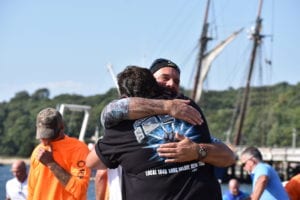
“I try to do it in remembrance of them, and all the brothers and sisters who are still struggling, and all those suffering from PTSD,” she said.
Mattituck veteran Tom Gross has done the event three years in a row. He served in the U.S. Army from 1984 through 1986 in the 82nd Airborne.
“Twenty-two vets a day commit suicide, that’s over 8,000 a year, that’s unacceptable,” he said. “It’s a brotherhood, I didn’t understand how much of a brotherhood it was 30 years ago when I was in it, and when I raised my right hand how far that would carry for the rest of my life.”

